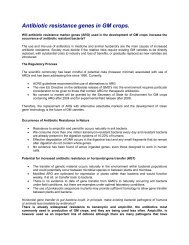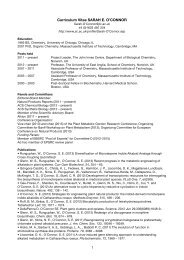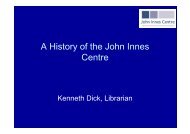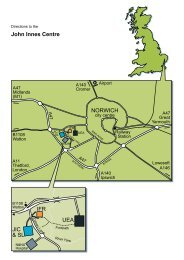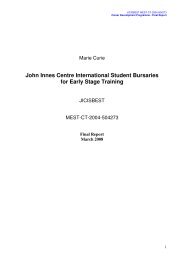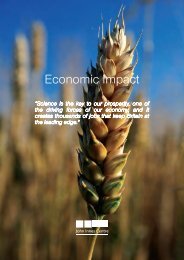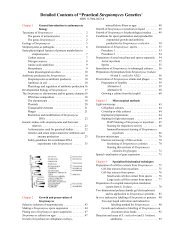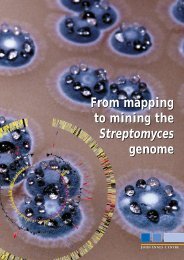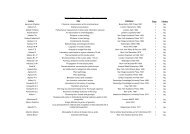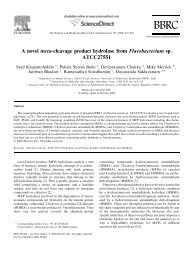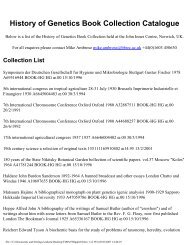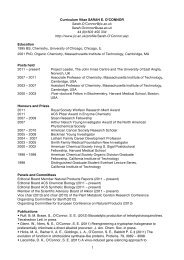1910s Timeline - John Innes Centre
1910s Timeline - John Innes Centre
1910s Timeline - John Innes Centre
Create successful ePaper yourself
Turn your PDF publications into a flip-book with our unique Google optimized e-Paper software.
1939 The 7 th International<br />
Congress of Genetics is<br />
overshadowed by war<br />
The Seventh International<br />
Genetical Congress takes place<br />
from 23 rd -30 th August 1939 in<br />
Edinburgh. The Congress,<br />
usually held every five years, is<br />
two years late, the Russians<br />
having abandoned their plan to<br />
hold the Congress in Moscow in<br />
1937. The suppression of<br />
genetics in Russia has begun<br />
and the Russians withdraw ten<br />
days before the Congress.<br />
Nikolai Vavilov was to have<br />
been the President but his place<br />
has to be filled by Francis Crew.<br />
On Wednesday 23 rd August 600<br />
geneticists from 55 countries<br />
assemble in Edinburgh. By the<br />
end of Thursday 24 th August<br />
international events begin to<br />
take over, the German<br />
delegation are the first to leave,<br />
followed by the Dutch,<br />
Hungarian, Scandinavian and<br />
Swiss. The Congress closes<br />
prematurely on the 29 th of<br />
August. At the Congress leading<br />
British and American geneticists<br />
consider a question set them by<br />
the Washington-based Science<br />
Service, an organization for<br />
communicating science to the<br />
public: ‘How could the world’s<br />
population be improved most<br />
effectively genetically?’ Their<br />
response is published in Nature<br />
on 16 September 1939. This<br />
short statement, later dubbed<br />
‘The Geneticists’ Manifesto’ is<br />
often heralded as the moment<br />
when geneticists, several of<br />
them active in the eugenics<br />
movement, spoke out to<br />
challenge the scientific and<br />
political assumptions of<br />
eugenics. J B S Haldane and C D<br />
Darlington are among the<br />
signatories<br />
1939 Britain declares war on<br />
Germany<br />
On September 1 st German<br />
troops invade Poland. Adolf<br />
Hitler does not respond to<br />
Chamberlain’s ultimatum that<br />
German troops be withdrawn<br />
from Poland immediately. On<br />
September 3 rd Prime Minister<br />
Neville Chamberlain announces<br />
on the radio that Britain is at<br />
war with Germany.<br />
http://www.eyewitnesstohisto<br />
ry.com/vocham.htm<br />
On Britain’s war preparations in<br />
1939, see:<br />
http://www.bbc.co.uk/ww2peo<br />
pleswar/timeline/<br />
1939 Sir Daniel Hall retires<br />
Daniel Hall retires on 30<br />
September 1939. During his<br />
thirteen years as Director the<br />
teaching and research activities<br />
of JIHI have extended. The<br />
number of exhibitions offered to<br />
student gardeners increased<br />
from eight to twelve and the<br />
total staff from 52 to 65. Hall’s<br />
legacy includes affiliation with<br />
the University of London, and<br />
the biennial summer courses in<br />
genetics and cytology which<br />
bring the Institution into regular<br />
contact with teaching and<br />
research students. C D<br />
Darlington once unkindly<br />
described Hall as in the stage of<br />
‘advanced comitteeosis’ when<br />
he joined JIHI. However, Hall’s<br />
personal connections with the<br />
powerful organisations behind<br />
agricultural and horticultural<br />
research proved extremely<br />
valuable to the Institution, both<br />
in terms of grants and additional<br />
land resources for the extension<br />
of fruit trials. Hall’s stature<br />
within Britain’s agricultural<br />
research community can be<br />
gauged by the book Agriculture<br />
in the twentieth century: essays<br />
on research, practice and<br />
organization (1939), a series of<br />
essays written in celebration of<br />
Page 30 of 91



